- Home
- Peter Matthiessen
Shadow Country
Shadow Country Read online
SHADOW COUNTRY
CONTENTS
Title Page
Dedication
Acknowledgments
Author’s Note
Map
E. J. Watson
Book One
Prologue: October 24, 1910
Erskine Thompson
Richard Harden
Henry Short
Bill House
Erskine Thompson
This Diary Belongs to Miss C. Watson
Erskine Thompson
Bill House
Sheriff Frank B. Tippins
Richard Harden
Owen Harden
Diary of Miss C. Watson
Erskine Thompson
Carrie
Bill House
Owen Harden
Erskine Thompson
Frank B. Tippins
Sarah Harden
Bill House
Erskine Thompson
Mamie Smallwood
Carrie Langford’s Diary
Bill House
Mamie Smallwood
Owen Harden
Tant Jenkins
Bill House
Owen Harden
Hoad Storter
Henry Short
Hoad Storter
Sarah Harden
Mamie Smallwood
Hoad Storter
Mamie Smallwood
Owen Harden
Erskine Thompson
Frank B. Tippins
Mamie Smallwood
Henry Short
Bill House
Hoad Storter
Bill House
Hoad Storter
Bill House
Mamie Smallwood
Frank B. Tippins
Carrie Watson
Nell Dyer
Carrie Langford
Hoad Storter
Book Two
Winter
The Undiscovered Country
Nell Dyer
In No Man’s Land
To Lost Man’s River
Nigger Short
The List
Owen And Sarah
Caxambas
The Indian
In the Backcountry
Watt Dyer
Affidavit of Bill W. House
Sarah Harden
Arbie Collins
Murder in the Indian Country
Black Moon Mirrors
In Columbia County
Watson Dyer
Ann Mary Collins Watson
The Deacon
The Empty Manor
The Fastest Fastball in the U.S.A.
The Banks Family
Fort White
Crazy Watson Eyes
Raking Leaves by Moonlight
Shining on Unseen Beneath the Pines
Witched Apples
A Failure of the Spirit
Two Green One-Cent Stamps
The Clarity of Churchyards
Alachua Prairie
In the Fall
A Memory of Shadows
South
The Domesday Book
Crockett Daniels
Bullet Necklace
Tant and Pearl
Eddie
Insulted Peas
Carrie Langford
Rob’s Visit
Nell Summerlin
Desecration
The Carver
Power of Attorney
Gunslinger Style
Panther Acres
Watson Dying
Lonelihood
North
The Burned Man
A Human Man
Heenious Murder
Night Rivers
The One Surviving Witness
Bloody Watson
Attorney Watson Watson
Belt Buckles and Buttons
Gator Hook
The Terrible Knowing and not Knowing
Wild Hog Jambaree
Everglade
Gone and Lost Forever
Homegoing
Dead Reckoning
Book Three
Chapter 1
Chapter 2
Chapter 3
Chapter 4
Chapter 5
Chapter 6
Chapter 7
Chapter 8
Chapter 9
Chapter 10
About the Author
Also by Peter Matthiessen
Copyright
With love to my brother Carey
and
my ever dear Maria
ACKNOWLEDGMENTS
Over its long history, in its various manifestations, this book has been much benefited by a number of helpful readers, beginning as ever with my kindly, keen-eyed, and mercifully candid wife, Maria, and by Neil Olson, an ever patient, thoughtful reader who is also my longtime agent. As a neighbor in the book’s cretaceous days when the whole was still inchoate, crude, and formless, John Irving was uncommonly generous with his time and strong clear comment. Jason Epstein, its first editor at Random House, was a strong advocate of the first of what became the so-called trilogy and so was his assistant Becky Saletan—already a fine editor when she took over the project but eventually snatched away by another publisher. Several others would preside who would also vanish elsewhere, perhaps in dismay over Watson’s length; one of these was Scott Moyers, the excellent young editor at Random House instrumental in placing the present volume with the Modern Library. Subsequently, I am pleased to say, the book found its way into the sure hands of the exceptionally intelligent and insightful Judy Sternlight, its present and (I trust) ultimate editor; in recent years, it has also been blessed by the discerning eye of my gifted assistant, Laurel Berger.
For the encouragement of all of these friends in the long throes of what can only be called a thirty-year obsession I am very grateful.
—Peter Matthiessen
AUTHOR’S NOTE
“The Watson Trilogy,” as the original has been called, came into being as a single immense novel which in its first draft manuscript must have been more than 1,500 pages long. Not surprisingly, my publisher balked at the enormity of what I had wrought and so, like a loaf of bread, this elemental thing was pulled into three pieces corresponding to its distinct time frames and points of view. The first part was then cut free and finished as Killing Mister Watson (the original title for the whole), and the second and third parts were given new titles as each was completed and published—Lost Man’s River (after a wild river in Watson’s region of the remote southwestern Everglades) and Bone by Bone (from a beautiful strange poem by Emily Dickinson).
Although the three books were generously received, the “trilogy” solution never fulfilled my original idea of this book’s true nature. While the first book and the third stood on their own, the middle section, which had served originally as a kind of connecting tissue, yet contained much of the heart and brain of the whole organism, lacked its own armature or bony skeleton; cut away from the others, it became amorphous, reminding me not agreeably of the long belly of a dachshund, slung woefully between its upright sturdy legs. In short, the work felt unfinished and its wretched author, after twenty years of toil (the early notes, as I discovered to my horror, dated all the way back to 1978), somehow frustrated and dissatisfied. The only acceptable solution was to break it apart and re-create it, to ensure that it existed somewhere (if only in a closet) in its proper form.
In a Paris Review interview (TPR #157, Spring 1999), I confessed my intention to devote a year to its remaking, though I had no serious expectation that whatever came of it would find a respectable publisher. However, the year set aside for the re-creation of this work has grown to six or seven. This was because Mister Watson and the desperate people who shared his desperate life came alive aga
in in the new pages and utterly reabsorbed me, and also because—in the necessary cutting and distilling that reduced the whole by almost 400 pages—their story has inevitably deepened and intensified.
In my original concept, the three books of the novel were interwoven variations in the evolution of a legend. In this new manifestation, the novel’s first book would be analogous to a first movement, since the whole feels symphonic in its rhythms, rising and falling, ever returning to one man’s obsessive self-destruction set against the historic background of slavery and civil war, imperialism, and the rape of land and life under the banner of industrial “progress.” Indirectly but perhaps most importantly, it concerns the tragic racism that still darkens the integrity of a great land like a cloud shadow.
Retained as prelude more or less intact and recurring variously throughout is the myth of Watson’s violent and controversial death. By design, this “ending” is given away at once, to get the plot out of the way of the deeper suspense of the underlying mystery. A powerful, charismatic man is shot to pieces by his neighbors—why? It is the why? that matters. How could such a frightening event take place in a peaceful community of fishermen and farmers? Was it really self-defense, as claimed by the participants, or was it a calculated lynching? How will Watson’s sons deal with the killing? And the lone black man in that crowd of armed whites—what was he doing there? Set against the horror of the Jim Crow era, Henry Short’s strange story has endless reverberations. In Shadow Country, this enigmatic figure is given his own voice as an observer and also his own final accounting.
The present book draws together in one work the themes that have absorbed me all my life—the pollution of land and air and water that is inevitable in the blind obliteration of the wilderness and its wild creatures and also the injustice to the poor of our own species, especially the indigenous peoples and the inheritors of slavery left behind by the cruel hypocrisy of what those in power represent as progress and democracy.
E. J. Watson was an inspired and exceptionally able frontier entrepreneur in the greatest era of invention and advance in American history. He was also a man severely conditioned by loss, reversal, and ill fortune who became so obsessed with taking part in the new century’s prosperity that he finally descended into lawlessness, excusing his ever more reckless actions by citing as precedent the corporate ruthlessness and murderous labor practices on the railroads, in the mines, and elsewhere—cold outrages common and flagrant in turn-of-the-century America that were indulged and even encouraged by a newly imperial U.S. government.
In the third book, we have Mister Watson’s own version of events, from early boyhood to the moment of his death—the final word, since surely he knows better than anyone else who he has become, this “shadow cousin” whom no relative will mention. The reader must be Watson’s final judge.
Though the book has no message, it might be argued that the metaphor of the Watson legend represents our tragic history of unbridled enterprise and racism and the ongoing erosion of our human habitat as these affect the lives of those living too close to the bone and way out on the edge, with no voice in the economic and environmental attrition that erode the foundation of their hopes and nothing with which to confront their own irrelevance but grit and rage. The ills of our great republic as perceived through the eyes of backcountry Americans might seem inconsequential, yet people who must deal with real hardship in the pursuit of happiness, not mere neurosis, can be bitterly eloquent and darkly funny, which is why I have always enjoyed their voices and enjoyed writing about them. In the end, however outlandish such characters may seem, their stories, too, are born of the human heart—in this case, the wild heart of a shadow cousin and so-called desperado.
In regard to Watson, reviewers of the original three books have cited D. H. Lawrence’s idea that “the essential American soul is hard, isolate, stoic, and a killer.” To a degree, this may be true of Watson, but he is more mysterious than that. As best I understand him after all these years, he was neither a “natural-born killer” nor a man of stunted criminal mentality—such men aren’t interesting. On the other hand, he was obsessed, and obsession that isn’t crazed or criminal is enthralling; in thirty years, I have learned a lot about obsession from too much time spent in the mind of E. J. Watson.
—Peter Matthiessen
Spring 2008
E. J. WATSON
HIS ANCESTORS:
John and William, sons of Lucius Watson of Virginia, moved to Edgefield District, South Carolina, in the middle of the eighteenth century. John’s son Michael, who became a renowned Indian fighter and hero of the Revolutionary War, married William’s daughter Martha, his first cousin. Their only son was Elijah Julian (1775–1850), who consolidated the large family holdings and left a plantation at Clouds Creek at Ridge, north of Edgefield Court House, to every one of his eleven children, including Artemas.
HIS PATERNAL GRANDPARENTS:
Artemas Watson (1800–1841) and Mary Lucretia (Daniel) Watson (1807–1838)
HIS PARENTS:
Elijah Daniel Watson (“Ring-Eye Lige”)
b. Clouds Creek, S.C., 1834
d. Columbia, S.C., 1895
Ellen Catherine (Addison) Watson
b. Edgefield Court House, S.C., 1832
d. Fort White, Fla., 1910
EDGAR ARTEMAS* WATSON:
b. Clouds Creek, S.C., November 11, 1855
d. Chokoloskee, Fla., October 24, 1910
1st wife (1878): Ann Mary “Charlie” (Collins) Watson, 1862–1879
Robert Briggs “Rob” Watson, b. Fort White, Fla., 1879–?
2nd wife (1884): Jane S. “Mandy” (Dyal) Watson, 1864–1901
Carrie Watson Langford, b. Fort White, Fla., 1885–?
Edward Elijah “Eddie” Watson, b. Fort White, Fla., 1887–?
Lucius Hampton Watson, b. Oklahoma Territory, 1889–?
3rd wife (1904): Catherine Edna “Kate” (Bethea) Watson, 1889–?
Ruth Ellen Watson, b. Fort White, Fla., 1905–?
Addison Tilghman Watson, b. Fort White, Fla., 1907–?
Amy May Watson, b. Key West, Fla., 1910–?
Common-law wife: Henrietta “Netta” Daniels, ca. 1875–?
Minnie Daniels, ca. 1895–?
Common-law wife: Mary Josephine “Josie” Jenkins, ca. 1879–?
Pearl Watson, ca. 1900–? Infant male, b. May 1910: perished in Great Hurricane of October 1910
EJW’S SISTER:
Mary Lucretia “Minnie” Watson, b. Clouds Creek, S.C., 1857, d. Ft.
White, Fla., 1912
Married William “Billy” Collins of Fort White, Fla., ca. 1880
Billy Collins died in 1907 at Fort White
The Collins children:
Julian Edgar, 1880–?
William Henry “Willie,” 1886–?
Maria Antoinett “May,” 1892–?
ALSO:
EJW’s great-aunt Tabitha (Wyches) Watson (1813–1905), 3rd wife and widow of Artemas Watson’s brother Michael: instrumental in marriage of Elijah D. Watson and Ellen Addison, d. Fort White, Fla. 1905 Her daughter Laura (1830–1894), childhood friend of Ellen Addison.
Married William Myers ca. 1867
Married Samuel Tolen ca. 1890
BOOK ONE
Look at a stone cutter hammering away at his rock, perhaps a hundred times without so much a crack showing in it. Yet at the hundred-and-first blow it will split in two, and I know it was not the last blow that did it, but all that had gone before.
—JACOB RIIS
PROLOGUE: OCTOBER 24, 1910
Sea birds are aloft again, a tattered few. The white terns look dirtied in the somber light and they fly stiffly, feeling out an element they no longer trust. Unable to locate the storm-lost minnows, they wander the thick waters with sad muted cries, hunting seamarks that might return them to the order of the world.
In the wake of hurricane, the coast lies broken, stunned. Day after day, a brooding wind nags at the mangroves, hurryin
g the unruly tides that hunt through the flooded islands and dark labyrinthine creeks of the Ten Thousand Islands. Brown spume and matted salt grass, driftwood; a far gray sun picks up dead glints from the windrows of rotted mullet at highwater line.
From the small settlement on the Indian shell mound called Chokoloskee, a baleful sky out toward the Gulf looks ragged as a ghost, unsettled, wandering. The sky is low, withholding rain. Vultures on black-fingered wings tilt back and forth over the broken trees. At the channel edge, where docks and pilings, stove-in boats, uprooted shacks litter the shore, odd pieces torn away from their old places hang askew, strained from the flood by mangrove limbs twisted down into the tide. Thatched roofs are spun onto their poles like old straw brooms; sheds and cabins sag. In the dank air, a sharp fish stink is infused with the corruption of dead animals and overflowed pits from which the privy shacks have washed away. Pots, kettles, crockery, a butter churn, tin tubs, buckets, blackened vegetables, saltslimed boots, soaked horsehair mattresses, a ravished doll are strewn across bare salt-killed ground.
A lone gull picks at reddened mullet cast on shore, a dog barks without heart at so much silence.
A figure in mud-fringed calico stoops to retrieve a Bible. Wiping grime from its caked cover with dulled fingers, she straightens, turns, and stares toward the south. The fingers pause. From the black mangrove forest down the Bay, a boat motor, softened by distance, comes and goes and comes again, bound east through Rabbit Key Pass from the Gulf of Mexico.
“Oh Lord no,” she whispers, half-aloud. “Oh please no, Mister Watson.”
Along toward twilight, Postmaster Smallwood, on his knees under his store, is raking out the last of his drowned chickens. Hearing the oncoming boat, he groans in the putrid heat. Soon one pair of bare feet, then another, pass in silence on their way down to the landing. More men follow. He knows his neighbors by their gait and britches.
Over low voices comes the pot-pot of the motor. Three days before, when that boat had headed south, every last man on the island watched it go, but the postmaster had been the only man to wave. He, too, had prayed that this would be the end of it, that the broad figure at the helm, sinking below the tree line into darkness at the far end of the Bay, would disappear forever from the Islands. Said D. D. House that day, “He will be back.”

 Lost Man's River: Shadow Country Trilogy
Lost Man's River: Shadow Country Trilogy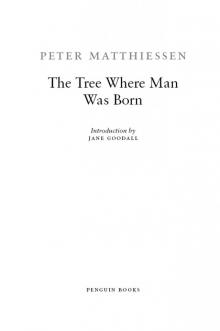 The Tree Where Man Was Born
The Tree Where Man Was Born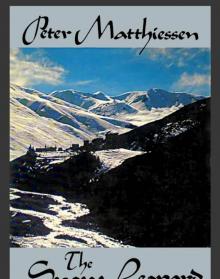 The Snow leopard
The Snow leopard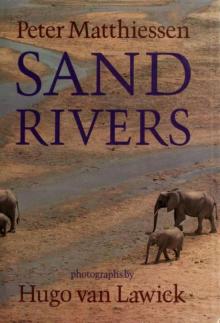 Sand Rivers
Sand Rivers The Cloud Forest
The Cloud Forest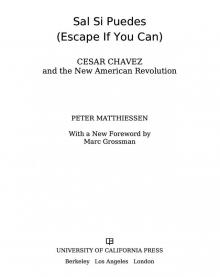 Sal Si Puedes (Escape if You Can)
Sal Si Puedes (Escape if You Can)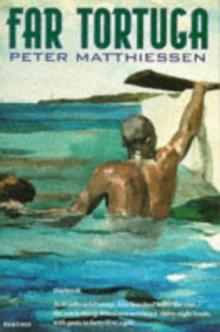 Far Tortuga
Far Tortuga Men's Lives
Men's Lives On the River Styx: And Other Stories
On the River Styx: And Other Stories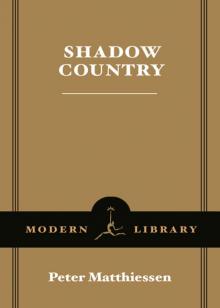 Shadow Country
Shadow Country At Play in the Fields of the Lord
At Play in the Fields of the Lord Lost Man's River
Lost Man's River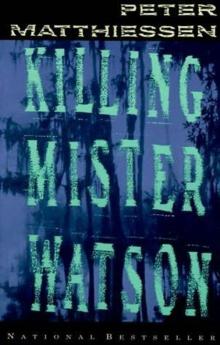 Killing Mister Watson
Killing Mister Watson On the River Styx
On the River Styx